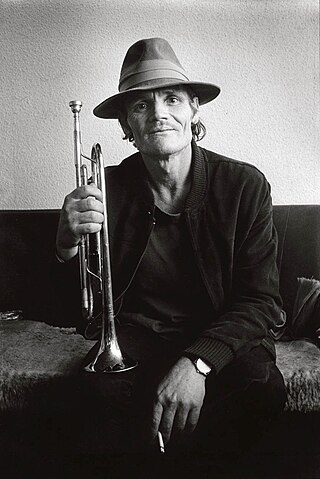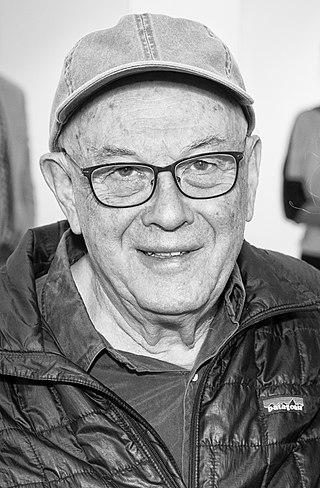
John Claridge (born 1944) is a British photographer, known for his work in advertising, black and white portraits in Soho and street photographs in the East End of London.

John Claridge (born 1944) is a British photographer, known for his work in advertising, black and white portraits in Soho and street photographs in the East End of London.
Claridge was born in Plaistow, Essex. His father worked in the docks, sold alcohol in New York during Prohibition [1] and was a bare-knuckle boxer in the dock areas in both New York and the East End; Claridge also boxed. [2] His mother was a shirt machinist working in Roman Road, Bow. [1] Aged 8, Claridge saw a plastic camera at an East End funfair and had to have it. A few years later, he saved up enough money from his paper round in the London docks to buy a proper camera to record the world he was growing up in. [3] From the age of 13, he started to buy jazz records, and it remained a lifetime obsession. [1] He had no formal training as a photographer but aged 15, began working for McCann Erickson advertising agency in their Photography and Design department. [4] He worked under Robert Brownjohn, the art director known for his James Bond title sequences, who encouraged him to have his first exhibition, of photographs on the East End, aged 16. [5]
In 1961 he left to become assistant to David Montgomery and in 1964 he opened his own studio in London. His first commissions were for Management Today, Queen, Town, Harper’s , and Nova magazines. He went on to work for many types of companies, especially tourist boards and car companies. [6] From 1976 to 1989, Claridge lived and had his darkroom in a flat on Frith Street, Soho, [6] above Ronnie Scott’s Jazz Club. [7] He shot the 1993 Pirelli Calendar. [6] In April 2018, The Association of Photographers included Claridge in its 50th anniversary exhibition of some the world's most respected photographers. [8] His work is held in the collections of The Arts Council of Great Britain, the Victoria & Albert Museum, the National Portrait Gallery and The Museum of Modern Art. [1] He has won over 700 awards for his editorial and advertising work in the 1960s. [2]
Claridge began taking photos of the East End as a teenager in the 1960s. The series was published as a book (East End) in 2016. [9]
He began taking the jazz portraits series while living in his flat above Ronnie Scott's. [6] In 1986, he photographed Chet Baker in the club:
Chet Baker came in one night in 1986, and I asked him if I could do a couple of shots before he went on. I said: 'I’ve got to tell you, when I was 13, I bought the Chet Baker Quartet record with Winter Wonderland on it. Russ Freeman was the pianist … ' And Chet said, 'Yeah, he was, in 1953.' He just stopped and stared, going back through his memory. And that’s when I took the picture. [7]
Having grown up in a boxing family, [2] Claridge has taken over 100 photographs of members of the London Ex-Boxer's Association, which were serially published by The Gentle Author, 2012-2013. [10]
Of Claridge's Soho Faces project (2004-2017) he said, "I decided to document the customers at The French in earnest. For me, it was the one place in Soho that still held its Bohemian character, where people truly chose to share time and conversation, and I became aware that many I had once chinked glasses with were no longer around." [11]
Claridge took over 500 portraits for Soho Faces [11] and he is considered to have taken more photographs of the East End than any other photographer. [5]
|
|

David Royston Bailey is an English photographer and director, most widely known for his fashion photography and portraiture, and role in shaping the image of the Swinging Sixties.

Chesney Henry "Chet" Baker Jr. was an American jazz trumpeter and vocalist. He is known for major innovations in cool jazz that led him to be nicknamed the "Prince of Cool".

Bruce Weber is an American fashion photographer and occasional filmmaker. He has made ad campaigns for Calvin Klein, Ralph Lauren, Pirelli, Abercrombie & Fitch, Revlon, and Gianni Versace, and made work for Vogue, GQ, Vanity Fair, Elle, Life, Interview, and Rolling Stone magazines.

Terence Patrick O'Neill was a British photographer, known for documenting the fashions, styles, and celebrities of the 1960s. O'Neill's photographs capture his subjects candidly or in unconventional settings.

Angus Rowland McBean was a Welsh photographer, set designer and cult figure associated with surrealism.

John Deakin was an English photographer, best known for his work centred on members of Francis Bacon's Soho inner circle. Bacon based a number of famous paintings on photographs he commissioned from Deakin, including Portrait of Henrietta Moraes, Henrietta Moraes on a Bed and Three Studies of Lucian Freud.

Bruce Landon Davidson is an American photographer. He has been a member of the Magnum Photos agency since 1958. His photographs, notably those taken in Harlem, New York City, have been widely exhibited and published. He is known for photographing communities that are usually hostile to outsiders.

Alexander Bassano was an English photographer who was a leading royal and high society portrait photographer in Victorian London. He is known for his photo of the Earl Kitchener in the Lord Kitchener Wants You army recruitment poster during the First World War and his photographs of Queen Victoria.
David Moore was an Australian photojournalist, historian of Australian photography, and initiator of the Australian Centre for Photography.

The French House is a pub and dining room at 49 Dean Street, Soho, London. It was previously known as the York Minster, but was informally called "the French pub" or "the French house" by its regulars. It sells more Ricard than anywhere else in Britain, and only serves beer in half-pints except on 1 April, when a recent custom has been that Suggs serves the first pint of the day.

Ida Kar was a photographer active mainly in London after 1945. She took many black-and-white portraits of artists and writers. Her solo show of photographs at the Whitechapel Gallery in 1960 was the first of its kind to be held in a major public gallery in London. Kar thus made a significant contribution to the recognition of photography as a form of fine art.

Walter Ernest Stoneman was an English portrait photographer who is known for taking photographs for the National Portrait Gallery (NPG) in London.

Merry-Go-Round is a large oil on canvas painting made by Mark Gertler in 1916, when he was 24 years old. It is perhaps his most famous work, and depicts men and women on a merry-go-round ride. The painting may have been inspired by a ride at the annual fair on Hampstead Heath. The painting is now held in Tate Britain.
Harry Diamond was a photographer known for his photographs of artists, jazz musicians, and the East End of London. He was born and worked in London.

John Cyril "Jack" Cato, F.R.P.S. was a significant Australian portrait photographer in the pictorialist style, operating in the first half of the twentieth century. He was the author of the first history of Australian photography; The Story of the Camera in Australia (1955)
William Thomas Whiffin (1878–1957) was a photographer who pioneered what would later be termed street photography in suburban East London in the first half of the twentieth century.
Colin Jones was an English ballet dancer-turned-photographer and prolific photojournalist of post-war Britain.
Colin O'Brien was a British street photographer. He began documenting life in London in the 1950s and continued to do so for over 60 years, leaving behind a photographic archive of around half a million negatives. His notable publications are London Life (2015) and Travellers' Children in London Fields (2013).
Carla Borel is a French-British photographer. She has made portraits and black and white street photographs in Soho, London.
Daniel Elwyn Jones, known as Dan Jones, is a British artist, collector of children's playground songs and human rights campaigner. He is an education advisor for the human rights organisation Amnesty International.
{{cite news}}: |last1= has generic name (help){{cite web}}: |last1= has generic name (help){{cite journal}}: |last1= has generic name (help)